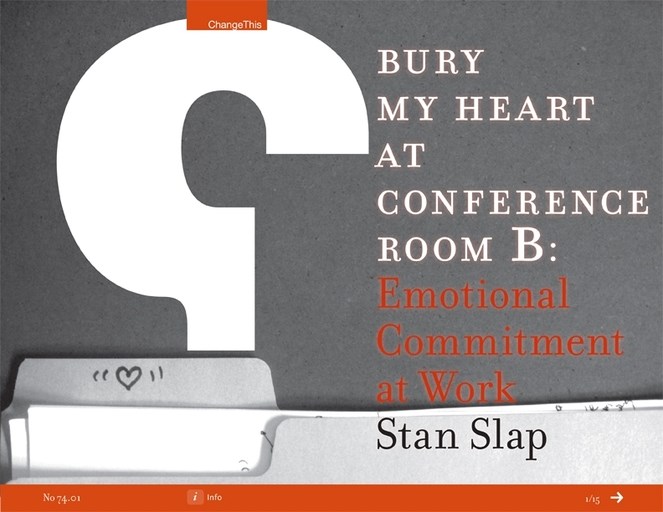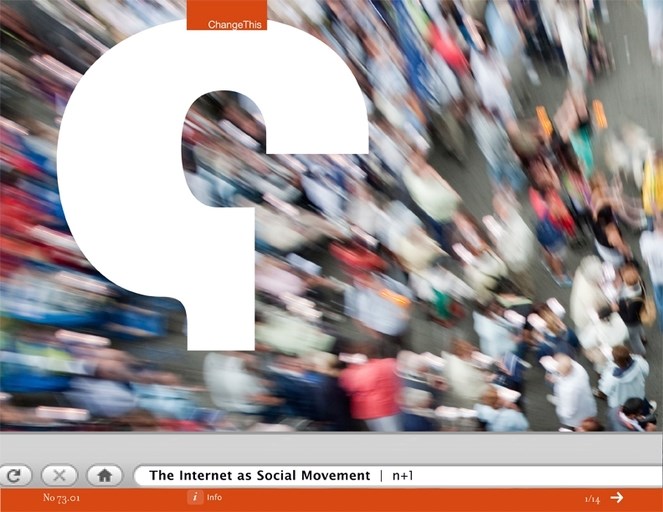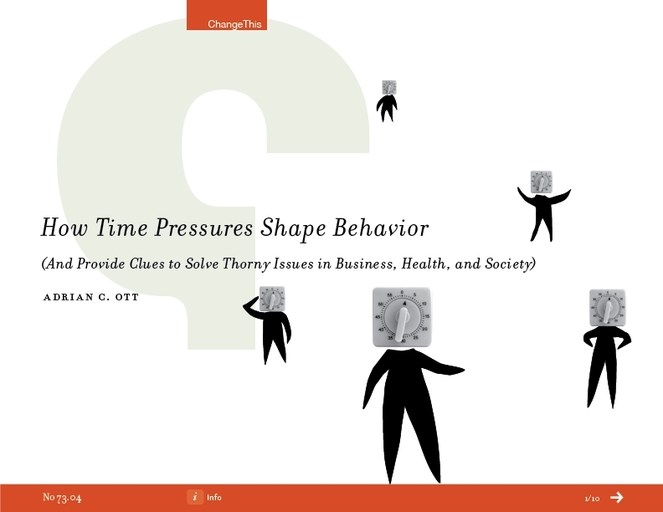ChangeThis RSS
"A manager's emotional commitment is the ultimate trigger for their discretionary effort, worth more than financial, intellectual and physical commitment combined. It's the kind of commitment that solves unsolvable problems, creates energy when all energy has been expended, and ignites emotional commitment in others, like employees, teams and customers. Emotional commitment means unchecked, unvarnished devotion to the company and its success; any legendary organizational performance is the result of emotionally committed managers."
Continue reading
"All of this was difficult, amazing, perplexing, astonishing—but so was the laying of the railroads and the sending of telegraph signals across the ocean. And historians of technology like to point out that great fanfare and promises have greeted all sorts of new devices, from the radio to the fax machine. But even before former Grateful Dead lyricist John Perry Barlow penned his 'Declaration of the Independence of Cyberspace' ('Governments of the industrial world,' it began, 'you weary giants of flesh and steel'), the internet was no mere fax machine. From the first, and in no small part because of its fervent supporters, it has felt less like a technology and more like a social movement—like communism, like feminism, like rock and roll. An ideology we could call webism. While the rest of us look up movie times, buy sweaters, and post jihadi videos, the webists proclaim the new age."
Continue reading
"For those who work in advertising, simply being fascinated with the future isn't enough. We have to glean insight from it and process it and wrap it up in a bright shiny message that sells this incrementally better future to the rest of the human race (or, at the very least, our target market), brought to you on behalf of Brand X. [...]
Of course this has never been an easy task. But today, for a number of reasons, advertising the future, and the future of advertising are more difficult and complicated propositions than ever. Because today, not only do advertising people have to fully understand and market the past, present and future of their brands, more than ever they must have a thorough grasp of the seemingly infinite changes that are shaping the future of their industry. This includes everything from the rapidly evolving media landscape to the constant emergence of new messaging delivery vehicles to the very ways in which creative and strategic ideas are developed, shared and created anew."
Continue reading
"Determining the factors that drive decision-making, and applying such mindsets to complex problems enables innovators, program developers, and marketers to apply a new lens to understand how time shapes human behavior. This approach goes well beyond defining new product or service attributes. It offers a fresh mindset that demonstrates that human behavior is not just shaped by psychological wants and needs, but is also shaped by the situation. No matter whether you are a business, government entity, or non-profit organization, understanding the Time-onomic forces that shape behavior and define a situation provides clues to solve some of our most challenging issues in business, health, and society."
Continue reading
"Many entrepreneurs feel that they cannot start a business without a great idea. They believe it will be impossible to succeed without a completely new concept, as the market will already be cornered by established businesses. Only by venturing into uncharted territory can they achieve their dreams. This is the fallacy of the great idea.
[...]
The simple truth is that it is quite possible to create a thriving business without a big idea. In fact, starting up with a tried and tested concept is very sensible. The real key to success is focus and brilliant execution. Yes, the world needs people with grand ideas who are willing to take big risks to further progress, but the world also needs small businesses creating jobs, and entrepreneurs should not be embarrassed about not having a claim on originality."
Continue reading










